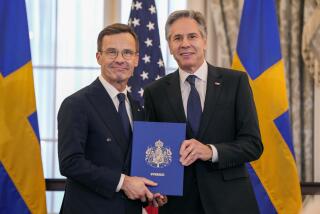Russia Postpones Joining Peace Plan : Military: ‘Partnership’ program calls for cooperation with NATO. Clinton Administration concerned.
- Share via
WASHINGTON — The escalating warfare between Bosnian Serb forces and U.N. peacekeepers in Bosnia-Herzegovina claimed another casualty Thursday: plans for greater cooperation between Russia and the North Atlantic Treaty Organization.
Russian Foreign Minister Andrei D. Kozyrev announced in Moscow that he has postponed Russia’s entry into the “Partnership for Peace,” President Clinton’s program for increased cooperation between NATO and the former Communist nations of Eastern Europe.
In Washington, State Department spokesman Mike McCurry said the Clinton Administration is concerned about the Russian decision and hopes that it does not mean a definitive reversal of Russia’s decision to join the partnership. Clinton has made Partnership for Peace the centerpiece of Western efforts to promote stability in Europe.
Kozyrev called off a scheduled April 21 visit to Brussels, where he was to enroll Russia in the program, and tied the decision to his government’s complaint that it was not fully consulted in advance of NATO air strikes against Bosnian Serb positions earlier this week. He told reporters Thursday that Russia first needs to define its conditions for collaborating with NATO.
“We are interested in much more serious relations, which would rule out surprises and unilateral measures, especially military ones, in those areas where we should be cooperating more closely,” Kozyrev said.
A senior U.S. official said it was unclear whether Russia’s decision to stay out of the partnership will last long. “There have been some indications that they would like to trade membership (in the partnership) for closer ties to Western economies . . . but we don’t know,” he said.
The Russians were upset by the NATO air strikes against the Serbs, and U.S. officials were annoyed by the Russians’ reaction, he said. Nevertheless, the two governments are still cooperating in diplomatic efforts in Bosnia, he said.
Russian special envoy Vitaly S. Churkin has been trying to persuade the Bosnian Serbs, who look to Russia as an ally, to return to peace talks, and the Administration backs his efforts, he said.
But the Serbs’ abduction of U.N. peacekeepers Thursday only underscored the limits on Moscow’s leverage--coming only one day after Churkin announced that the Serbs assured him that they would not “throw down the gauntlet to the international community.”
“We believe that the Russians are working in furtherance of the objectives that we too have--which is an end to the fighting wherever it’s occurring . . . resumption of discussions about cessation of hostilities and continued pursuit of an overall political settlement that the international community can then help enforce,” McCurry said.
“I don’t want to suggest that on every aspect of the negotiation under way do we necessarily see things the same way,” he added.
Meanwhile, Clinton urged the Bosnian Serbs to stop attacking U.N. peacekeepers.
“I think the Serbs would be making a mistake to start treating the United Nations and NATO forces as adverse combatants,” Clinton said. “That is not what we are doing. We are trying to get them to honor their words.”
McCurry denied that the Administration is threatening any specific retaliation for attacks on U.N. forces. But, he added, “I think the Serbs have come to know in the last several days that there is an ‘or else.’ ”
McManus reported from Washington and Boudreaux reported from Moscow.
More to Read
Sign up for Essential California
The most important California stories and recommendations in your inbox every morning.
You may occasionally receive promotional content from the Los Angeles Times.














